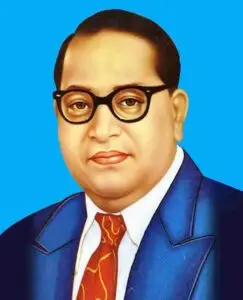Dr. B.R. Ambedkar: Architect of the Indian Constitution and Champion of Equality
 Bharat Ratna Dr. Bhim Rao Ambedkar
Bharat Ratna Dr. Bhim Rao Ambedkar
Dr. B.R. Ambedkar, born on April 14, 1891, was a jurist, economist, politician, and social reformer who made immense contributions to the rights of marginalized and oppressed communities in India. He is primarily remembered as the principal architect of the Indian Constitution and a
relentless fighter against caste oppression. His life’s work laid the foundation for a more equitable society, and his legacy continues to inspire movements for social justice today.
Early Life and Education
Ambedkar was born into a Mahar family, regarded as one of the lowest castes in the Hindu social hierarchy. His father served as an army officer, providing some stability for the family despite the severe discrimination Ambedkar faced during his childhood. He distinguished himself academically, becoming one of the first Dalit students to gain admission to Elphinstone College in Mumbai. His pursuit of higher education led him to the United States, where he received a scholarship from the Gaekwar of Baroda. He completed his Bachelor’s degree at Columbia University and earned several doctorates from prestigious institutions, including the London School of Economics. These educational experiences greatly influenced his ideas on social justice and equality.
Advocacy for Social Justice
After returning to India in 1924, Ambedkar dedicated himself to combating social injustices faced by Dalits. He founded the Bahishkrit Hitakarini Sabha to promote education and socio-economic improvement for depressed classes. Through publications like Mook Nayak and Bahishkrit Bharat, he raised awareness about caste discrimination. In 1936, he established the Independent Labour Party to represent Dalit interests in politics, believing that political representation was crucial for social reform. His involvement in the Poona Pact of 1932 resulted in reserved legislative seats for Dalits, underscoring his commitment to political advocacy.
Role in Constitution Drafting
Ambedkar’s most significant contribution came after India gained independence in 1947, when he was appointed the first Law Minister. He chaired the drafting committee responsible for formulating the Indian Constitution, ensuring it included provisions to abolish untouchability and promote equality. The Constitution, adopted on January 26, 1950, is celebrated for its dedication to social justice and civil rights. As Law Minister, Ambedkar also enacted labor reforms aimed at improving workers’ conditions, though he resigned in 1951 after disagreements with Prime Minister Jawaharlal Nehru on other policies.
Conversion to Buddhism
In a landmark decision reflecting his disillusionment with the caste system inherent in Hinduism, Ambedkar embraced Buddhism on October 14, 1956. This act was both a personal spiritual journey and a political statement against caste oppression. He advocated for mass conversions among Dalits, which played a significant role in the emergence of the Dalit Buddhist movement.
Bharat Ratna and Legacy
Ambedkar’s immense contributions to social reform, the drafting of the Constitution, and his lifelong dedication to equality were recognized posthumously when he was awarded the Bharat Ratna, India’s highest civilian honor, in 1990. This prestigious award solidified his place among India’s greatest leaders and reformers. Although he passed away on December 6, 1956, his message and work continue to inspire generations seeking social justice in India. Affectionately known as “Babasaheb” or respected father, Ambedkar’s legacy of fighting for equality and human rights endures, exemplified by his maxim: “Educate, Agitate, Organize.”
Ambedkar’s life story is not just a testament to personal resilience in the face of societal oppression; it also serves as a blueprint for achieving equality through education and political engagement. He remains a towering figure in India’s history, whose dedication to dismantling caste oppression and championing human rights continues to resonate today. His legacy is one of justice, equality, and empowerment, transforming India into a more just and inclusive society.